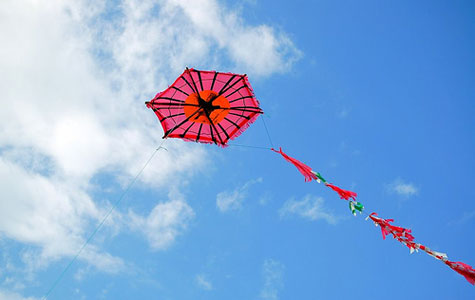The Clean Monday (Ash Monday) indicates the end of Carnival and the beginning of fasting (Lent) in the Orthodox church.

Photo taken from periergaa.blogspot.com
The Greek “Clean Monday” is celebrated 40 days before the Resurrection of Christ, the Christian Easter. It was named this way because Christians are “cleaned up” spiritually and physically; it is a fasting day and a day of rest.
The beginning of Lent in Greece is a special day celebrated by getting together and eating various Lenten dishes, like the traditional bread lagana (unleavened bread made that day only) and halva. On this day, it is common for people to think about ‘getting back to nature’ and so you may see many families and groups of friends making trips to nearby natural destinations. The best part of it is the flying of the kite, that needs great craftsmanship and perfect weather of course.
The tradition of celebrating this day in the nature is called “Koulouma” (Κούλουμα). Greeks gather in groups of people and visit the countryside, taking with them meatless dishes, and have fun flying the kite. And as in every Greek celebration, there is lots of dancing and singing.
“Clean Monday” has been named this way by the Greeks throughout the centuries and means “spiritual and physical purification”. The flying of kites is often interpreted as the desire of man to chase away evil.
Many also associate this name with the fact that housewives “clean” their kitchen utensils on Clean Monday to recover from all the cooking that is done during the Carnival.
 Things you can eat on Clean Monday:
Things you can eat on Clean Monday:
Seafood: shrimp, crawfish, lobster, crab, octopus, squid.
Shellfish: mussels, oysters, clams, shimmery.
Legumes: soup, salad eyed.
Vegetables: Salads and pickles
Bread: lagana
Sweets: halva, jams and sweets
♦
This is a day of fun, food and family.
Where are you spending this Monday?
♦
source: wikipedia, www.hotelsline.gr
Related posts you might like:
 Ioanna Aggelidaki is the Social Media Manager and Contributor of the Greek Weddings and Traditions Blog.
Ioanna Aggelidaki is the Social Media Manager and Contributor of the Greek Weddings and Traditions Blog.
You can connect with Ioanna on Twitter, check her creative Cow Art and follow her blog, life portfolio.
Want to Learn More About Greek Weddings & Traditions?
Subscribe to the Blog and Follow Us:
























